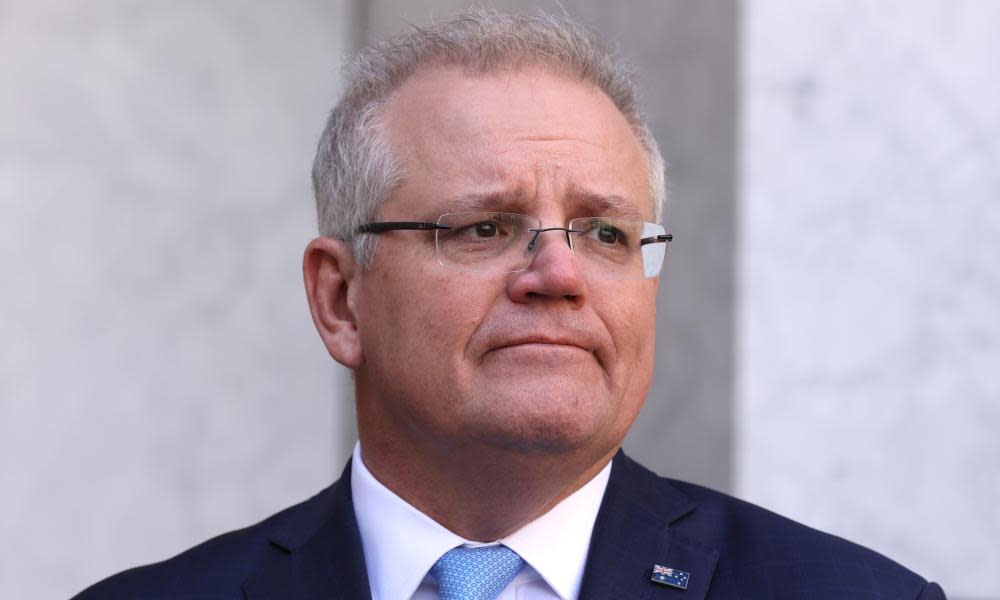Scott Morrison gives masterclass in political malleability over aged care Covid deaths

Scott Morrison and his ministers have developed a preoccupation with attribution. Take one, obvious example. Australia’s second wave of coronavirus infections is referred to on high rotation as “the Victorian wave”, lest anyone be confused about the origins of the outbreak.
Over the past couple of days, the most senior Victorian in the Morrison government, Josh Frydenberg, has been pursuing project attribution down to the footnotes. “What we’re dealing with here is hundreds of new cases in Victoria every day, 97-to-98% of new cases in Australia are coming from Victoria alone,” the treasurer said last week.
“There needs to be accountability, there needs to be an explanation. Victorians deserve that, Victorians want that, Victorians need that at this difficult time. They’re being asked to make major sacrifices right now.”
Attribution is a drumbeat in the daily press conferences. Morrison makes a point of saying when premiers make decisions, they need to be accountable for them, and they need to explain them.
But when it comes to pursuing matters squarely within the purview of the commonwealth, we suddenly find ourselves in much more malleable territory. Monday’s press conference furnished a masterclass in malleability.
The prime minister was asked about deaths in aged care. Aged care is a commonwealth responsibility. Let’s be clear: if Morrison’s attribution rule was being applied uniformly rather than in transparently arbitrary fashion, we would all be banging on about “the Canberra wave” in aged care.
In any case, a reporter on Monday pointed out that according to evidence given to the aged care royal commission, 68% of Covid-related deaths in Australia had occurred in nursing homes. Morrison was asked what he would say to the families, given that statistic, and given the commonwealth responsibility.
The prime minister empathised. He had no truck with “hideous” and “amoral” arguments advanced in some opinion columns in some news outlets that the elderly should be sacrificed during this pandemic – a position he’s held consistently.
But Morrison saw the death rate through a different prism than a prime minister having a specific, negative charge to answer. Morrison said it was terrible and tragic that elderly Australians had died, but “sadly” it was not surprising that fatalities were concentrated in aged care because elderly people were “the most vulnerable in our community”.
The prime minister speculated that perhaps another, more positive, lesson could be extracted from the figures. Perhaps the higher death rate in aged care compared with the rest of the community pointed to the success in containing fatalities in less vulnerable sectors of the Australian community. “I don’t think I would agree with the assessment of the implications of the figures you have referred to,” Morrison told the reporter.
Unfortunately for the prime minister, in a forum outside the press conference, the counsel assisting the aged care royal commission was less glass-half-full. In an opening statement, counsel suggested evidence would show neither the health department nor the aged care regulator developed a Covid-19 plan specifically for aged care – which sounds like a commonwealth-specific deficiency.
As well as the allegations of absent strategy, the aged care regulator was also being accused of causing a “catastrophic communications failure” causing a “potentially deadly delay” after revelations it took them four days to inform the government about a Covid-19 outbreak at Melbourne’s St Basil’s aged care home.
Separate to the serious questions about aged care was the inconvenience of the Ruby Princess inquiry. Administrative bungling with that vessel sparked hundreds of Covid-19 cases, leading to at least 22 deaths. It has come to light recently that an Australian Border Force official gave verbal authorisation for passengers to disembark from the cruise ship, and mistook negative flu test results for Covid-19 results.
Morrison has said the commonwealth will cooperate with the inquiry, but the New South Wales premier, Gladys Berejiklian, has rebuffed calls to extend the process so it can hear from the federal officials who have refused to appear.
Morrison got a question on Monday about whether two federal officials should give evidence directly at that inquiry – something that would render the promised cooperation something more than nominal.
“I’ve said we would cooperate with the inquiry as we have,” the prime minister said. “That’s what we continue to do.” The follow up question – “but they haven’t answered direct questions” – hung in the air, unanswered. Morrison moved on.
The prime minister is entirely correct to say political leaders are accountable for their actions or lack of actions during this crisis. Who could possibly argue with that?
But the point is they are all accountable. Accountability is not situational, or a sliding scale. Some leaders are not more accountable than others to suit the convenience of politics, or because someone needs to create a diversion, or construct a firewall between themselves and a reckoning.
Morrison told reporters on Monday no one got a leave pass from scrutiny during a crisis.
Saying that is easy.
Actually meaning it, of course, is much harder.

 Yahoo News
Yahoo News 